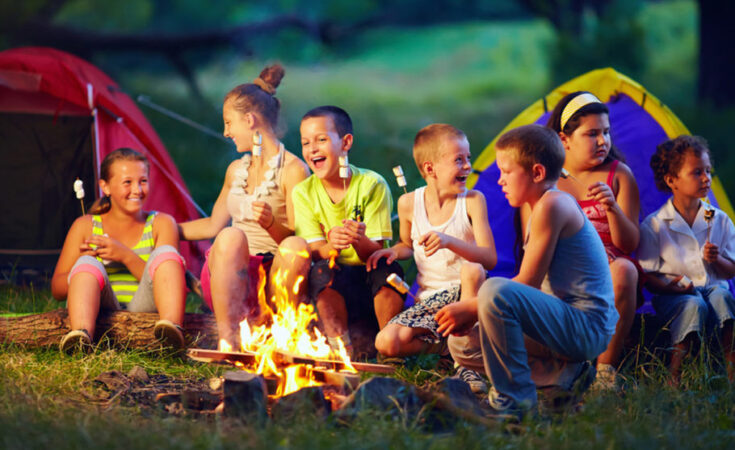Camping is an exciting experience for children. Getting to run around in the wilderness, walking in the mud, sleeping in a tent, having an opportunity to see birds and insects they see only in the books, gazing at the stars, bathing under the sky, and doing things that they do not get to do at home can add thrill to their lives.
While you may be apprehensive about camping with your children owing to the fundamental challenges camping brings, you can make memories for a lifetime while in the wilderness with them. Being away from the usual comforts of the home can be a learning experience for children. Besides, it can also help you raise active and environmentally conscious children.
Keep reading as we list some fun ideas on making camping fun for you and your children.
Tips For Camping With Kids
The following tips can give you a hassle-free experience when camping with children and allow you and your children to have the best time of your lives.
1. Involve them in the planning
Involve the children when planning for a camping expedition—right from viewing the map to deciding what everyone is expecting from the experience, choosing a tent, and deciding on activities. If everybody’s opinions and choices match, the camping trip will be fun for the entire family.
2. Choose your campsite carefully
Pick campgrounds that have amenities to suit your family’s requirements. For example, many camp fields are equipped with ball fields, pools, playgrounds, toilets, hot showers, etc. You may pick campsites that are easy to access and have more facilities if you do not go camping often.
3. Research the campsite
Learn more about flora and fauna of your campsite. You can bring along binoculars, notebooks, pens, and cameras to mark the things you see. You may also explore some area attractions, hikes, trails, etc.
4. Do a trial run at home or a resort
Set up a tent in your backyard or do a practice run at a resort that offers some adventurous activities. It will help the children be prepared and anticipate similar or more adventurous activities at the campsite.
5. Be prepared for some trial and error
Camping with children might not go as expected, especially when it is their first time. So, you may consider trying a short camping experience at a park nearby for just a night to begin with.
6. Leave the gadgets at home
Leave all the nonessential devices at home. The children do not need extra exposure to the screens and new distractions when away and camping. Being away from devices will help them connect with the natural beauty around them.
7. Indulge in responsible camping
Coexist with nature responsibly. Teach your children to pick up the trash, even if it is not their own. Ask them not to cause any disturbance to the environment and to avoid plucking flowers or leaves unnecessarily.
8. Carry light snacks and meals
Carry enough snacks with you as being overly active at camps can make your little ones hungry. Plan on packing food your children already like, as trying new foods in such camps might not be a good idea. Introduce the children to the standard camping tradition of roasting marshmallows or cooking hotdogs on the campfire.
9. Travel light
Avoid carrying too much luggage. Carrying too many books or toys might keep your child engaged in them even when out in nature.
10. Try park programs
You can encourage your children to take part in park programs organized at national and state parks. It will give them a good beginner’s experience of camping.
11. Try out new activities
Try to get out of your comfort zones and indulge in new activities as a family. For example, you can try some rope courses, paragliding, fishing, kayaking, etc.
12. Carry a first aid kit
Pack a first aid kit that contains medicines, sunscreen, lotions, bug sprays, band-aids, anti-allergic medicines, tick pullers, etc.
13. Try beach camping
Camping on a beach is non-conventional but fun. You may try fun beach games, water sports, parasailing, etc., at the beach. Also, looking at the never-ending waves from the tent can be an enchanting experience for your children.
14. Set the children free
Let your children explore the campsite. Let them go a little wild when in the wild! Of course, you could set safe boundaries, but let them play in the mud, climb trees, splash the puddle and have fun under your careful watch.
15. Carry an extra small tent
Set up a small tent next to your regular tent. The small tent can be used as a play area. It will help you keep the family tent clutter-free.
16. Maintain the decorum of the place
Camping can be a good opportunity to teach children the lessons on coexisting with nature. For example, teach them how to keep their voices to desirable levels to avoid disturbing other campers and animals.
17. Indulge in some geocaching fun
Geocaching is an activity where a geocache container is hidden from the public view to challenge the participants to use a GPS and coordinates published on the Internet to locate the item. It is allowed in some national parks.
18. Keep some surprises a secret
Carry some snacks, treats, or games with you. You may use them when they have an emotional meltdown, and nothing else uplifts their spirits. Also children love surprises, and such surprises can lift their spirits.
19. Carry your bicycles
Family bike riding can be super fun. If you are getting the bikes along, take all precautions, such as wearing helmets and riding only on the permitted routes.
20. Carry some gear to make camping more fun
Lightweight backpacks, hammocks, sleeping bags, tents, and other long-lasting and sturdy camping gear can make camping with children easier. You may try buying used gear online to save some money. Ensure you double-check the quality of the second-hand goods bought online.
21. Indulge in stargazing
You can take along a small telescope. Lay some sleep bags outside of the tent and gaze at the stars. You may also carry some kid-friendly books that explain constellations.
22. Share the responsibility
Your children may not be very enthusiastic about doing chores at home, but camp chores are mostly a hit with kids. Gathering potable water, setting up tents, building a fire, etc., are fun activities they would enjoy while learning new things simultaneously.
23. Carry enough extra clothes for all types of weathers
The evenings through early mornings can be chilly in the woods. Carry warm clothes, warm socks, thermal wear, extra blankets, etc., to keep the children warm at night. You may also carry raincoats and extra clothes to keep them dry.
24. Set up a hand and foot washing station
You can get a double water jug with an open-and-close spout control. Pair it with a plastic tub or bin with a flat bottom where children can step in to wash their feet. Carry soap, hand towels, and enough water for drinking, washing, cooking, and cleaning.
25. Set up a kids’ bathing station
If you are at a campsite with no shower set-ups, you may carry plastic bathtubs or inflatable mini pools. Fill water in them in the morning and place them under the sun for the water to warm up. You may also carry solar-heated shower bags along.
26. Carry enough disinfectant wipes and baby wipes
Use baby wipes to wipe off their hands, feet, and face before entering the tent to avoid all the mud and dirt coming into the tent. For example, when they drop their toys in the mud, you can use antibacterial wipes to clean them, so you don’t waste water washing them each time.
27. Buy essentials for night-time safety
Carry glow sticks and glow stickers, so it is easy for you to track your children in the dark. They can join the glow sticks and wear them as bracelets or necklaces. You can also consider getting glow-in-the-dark ropes or glow-in-the-dark tent stakes so that children do not trip over them in the dark. Also, ensure to pack enough flashlights and battery-operated night lights.
28. Stick to the usual routine as much as possible
Young children thrive on routine. If they have a habit of reading a particular book before going to bed, do not forget to bring it along. Try to follow the same bedtime routine and timings.
29. Carry essentials for lighting a campfire
No camp is complete without a campfire! Carry matchboxes, lighters, lightning nuggets, etc., to start a fire.
30. Choose a good camping pitch
Pick a camping pitch that is not crowded and at a distance from other campers. If the children are still potty training, pick a site with washrooms nearby. If the children are young, do not pick a site with a water body in the vicinity.
31. Carry a portable potty seat for young children
If your children are shy of defecating in the woods and there are no washrooms at the campsite, carry a portable potty seat.
32. Hope for the best, plan for the worst
Do a thorough research of the campsite before camping with children. Be aware of the nearest freshwater source, animals in the area, mobile network availability, etc. Bring along power banks to keep the electronic devices and emergency lights charged, and keep your emergency help kit handy. With kids, be prepared for any last moment changes in the plan and schedule.
33. Create a cozy sleeping environment
The dark woods may seem scary to young children at night. If you have more than one child, you can consider buying a large sleeping bag and letting the kids share the bag. You could also place thick yoga mats under their sleeping bags for added comfort.
34. Stay flexible
While it is important to stick to schedules, do not be too hard on yourself or your children. Be a bit flexible with the schedules, as a different sleeping environment may make it a little difficult for the child to sleep as per their timings and schedules. While camping with children, patience is key.
35. Watch, learn, and grow from the mistakes
For the initial two or three camping expeditions, you might make some mistakes and not be able to perfect them, especially when with children. So, take notes and improvise the next time. Learning from mistakes is a valuable life lesson for children too.
36. Click pictures to create memories for life
Click plenty of pictures when at the camp and create memories for a lifetime and beyond. The images will be a treasure for your children when they grow up. Do not forget to make mental images of the pristine natural beauty around you!
Camping is fun at all ages. However, camping with children can be a different kind of experience. Every season brings a different flavor to camping. Spending time with children away from screens and other distractions can help in fostering a loving family bond. It can also be a good opportunity to teach them some life skills.
References:
MomJunction’s articles are written after analyzing the research works of expert authors and institutions. Our references consist of resources established by authorities in their respective fields. You can learn more about the authenticity of the information we present in our editorial policy.



































